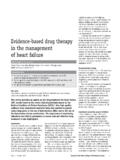Transcription of De-escalating and escalating treatments for early-stage ...
1 SPECIAL ARTICLEDe- escalating and escalating treatments forearly-stage breast cancer: the St. Gallen InternationalExpert Consensus Conference on the Primary Therapyof Early Breast Cancer 2017G. Curigliano1*, , H. J. Burstein2 , E. P. Winer2, M. Gnant3, P. Dubsky3,4, S. Loibl5, M. Colleoni1,M. M. Regan6, M. Piccart-Gebhart7, Senn8& B. Thu rlimann9, on behalf of the Panel Members of theSt. Gallen International Expert Consensus on the Primary Therapy of Early Breast Cancer 20171 Breast Cancer Program, Istituto Europeo di Oncologia, Milano, Italy;2 Breast Oncology Center, Dana-Farber Cancer Institute, Harvard Medical School, Boston, USA;3 Department of Surgery, Comprehensive Cancer Center Vienna, Medical University of Vienna, Vienna, Austria;4 Klinik St.
2 Anna, Luzern, Switzerland;5 German BreastGroup, Neu-Isenburg, Germany;6 Department of Biostatistics and Computational Biology, Dana-Farber Cancer Institute, Harvard Medical School, Boston, USA;7 Department of Medical Oncology, Institut Jules Bordet, UniversitO Libre de Bruxelles, Brussels, Belgium;8 Tumor and Breast Center ZeTuP, St. Gallen;9 Breast Center,Kantonsspital St. Gallen, St. Gallen, SwitzerlandPanel Members of the St. Gallen International Expert Consensus on the Primary Therapy of Early BreastCancer 2017F. Andre 10, J. Baselga11, J.
3 Bergh12, H. Bonnefoi13, S. Y. Brucker14, F. Cardoso15, L. Carey16, E. Ciruelos17,J. Cuzick18, C. Denkert19, A. Di Leo20, B. Ejlertsen21, P. Francis22, V. Galimberti1, J. Garber2, B. Gulluoglu23,P. Goodwin24, N. Harbeck25, D. F. Hayes26, Huang27, J. Huober28, K. Hussein29, J. Jassem30, Z. Jiang31,P. Karlsson32, M. Morrow11, R. Orecchia1, K. C. Osborne33, O. Pagani34, A. H. Partridge2, K. Pritchard35,J. Ro36, E. J. T. Rutgers37, F. Sedlmayer38, V. Semiglazov39, Z. Shao40, I. Smith41, M. Toi42, A. Tutt43,G. Viale44,45, T. Watanabe46, T. J. Whelan47& de Cance rologie Gustave Roussy, Villejuif, France;11 Memorial Sloan Kettering Cancer Center, New York, USA;12 Karolinska Institute and University Hospital,Stockholm, Sweden;13 University of Bordeaux, Bordeaux, France;14 Universit ats-Frauenklinik Tu bingen, Tu bingen, Germany;15 Champalimaud Cancer Centre, Lisbon,Portugal;16 Lineberger Comprehensive Cancer Center, University of North Carolina, Chapel Hill, USA;17 Hospital Universitario 12 de Octubre, Madrid, Spain.
4 18 Centrefor Cancer Prevention, Wolfson Institute of Preventive Medicine, Queen Mary University of London, London, UK;19 Institut fu r Pathologie, Charite Universit atsmedizin Berlin, Berlin, Germany;20 Azienda Usl Toscana Centro, Prato, Italy;21 Rigshospitalet, Copenhagen, Denmark;22 Peter McCallum Cancer Centre,Melbourne, Australia;23 Marmara University School of Medicine, Istanbul, Turkey;24 University of Toronto, Mount Sinai Hospital, Toronto, Canada;25 University ofMunich, Mu nchen, Germany;26 Comprehensive Cancer Center, University of Michigan, Ann-Arbor, USA;27 National Taiwan University Hospital, Taipei, Taiwan;28 University of Ulm, Ulm, Germany;29 The National Cancer Institute, Cairo University, Cairo, Egypt;30 Medical University of Gdansk, Gdansk, Poland;31 HospitalAffiliated to Military Medical Science, Beijing, China;32 Institute of Clinical Sciences, Sahlgrenska Academy, Sahlgrensky University Hospital, Gothenburg, Sweden;33 Baylor College of Medicine, Houston, USA.
5 34 Institute of Oncology Southern Switzerland, Ospedale San Giovanni, Bellinzona, Switzerland;35 Sunnybrook OdetteCancer Center, University of Toronto, Toronto, Canada;36 National Cancer Center, Ilsandong-gu, Goyang-si, Gyeonggi-do, Korea;37 Netherlands Cancer Institute,Antoni van Leeuwenhoek Hospital, Amsterdam, The Netherlands;38 LKH Salzburg, Paracelsus Medical University Clinics, Salzburg, Austria; Petrov ResearchInstitute of Oncology, St. Petersburg, Russian Federation;40 Fudan University Cancer Hospital, Shanghai, China;41 The Royal Marsden, Sutton, Surrey, UK;42 GraduateSchool of Medicine Kyoto University, Sakyo-ku, Kyoto City, Japan;43 Breast Cancer Now Research Centre, The Institute of Cancer Research, London, UK;44 Universityof Milan, Milan;45 Istituto Europeo di Oncologia, Milan, Italy;46 Hamamatsu Oncology Center, Hamamatsu, Japan;47 McMaster University, Hamilton, Canada;48 National Cancer Center, Chaoyang District, Beijing, China*Correspondence to: Prof.
6 Giuseppe Curigliano, Division of Early Drug Development for Innovative Therapies, Istituto Europeo di Oncologia, Via Ripamonti 435, 20141 Milano,Italy. Tel: 39-02-57-48-94-39; Fax: 39-02-94-37-92-24; E-mail: Both authors contributed equally as senior Author 2017. Published by Oxford University Press on behalf of the European Society for Medical rights reserved. For Permissions, please email: of Oncology28: 1700 1712, 2017 online 21 June 2017 The 15th St. Gallen International Breast Cancer Conference 2017 in Vienna, Austria reviewed substantial new evidence on loco-regionaland systemic therapies for early breast cancer.
7 treatments were assessed in light of their intensity, duration and side-effects, seekingwhere appropriate to escalate or de-escalate therapies based on likely benefits as predicted by tumor stage and tumor Panel favored several interventions that may reduce surgical morbidity, including acceptance of 2 mm margins for DCIS, theresection of residual cancer (but not baseline extent of cancer) in women undergoing neoadjuvant therapy, acceptance of sentinelnode biopsy following neoadjuvant treatment of many patients, and the preference for neoadjuvant therapy inHER2positive andtriple-negative, stage II and III breast cancer.
8 The Panel favored escalating radiation therapy with regional nodal irradiation in high-riskpatients, while encouraging omission of boost in low-risk patients. The Panel endorsed gene expression signatures that permitavoidance of chemotherapy in many patients with ER positive breast cancer. For women with higher risk tumors, the Panel escalatedrecommendations for adjuvant endocrine treatment to include ovarian suppressionin premenopausal women, and extended therapyfor postmenopausal women. However, low-risk patients can avoid these treatments .
9 Finally, the Panel recommended bisphosphonateuse in postmenopausal women to prevent breast cancer recurrence. The Panel recognized that recommendations are not intendedfor all patients, but rather to address the clinical needs of the majority of common presentations. Individualization of adjuvant therapymeans adjusting to the tumor characteristics, patient comorbidities and preferences, and managing constraints of treatment cost andaccess that may affect care in both the developed and developing :St Gallen Consensus, early breast cancer, radiation therapy, surgery, systemic adjuvant therapiesIntroductionThe 15th St.
10 Gallen International Breast Cancer ConsensusConference was held in March 2017 in Vienna, Austria. Thismeeting is a global, multidisciplinary conference with representa-tives from 160 nations and every continent. The highlight of theconference is the consensus panel, in which 52 panelists reviewand discuss specific areas of treatment with a focus on controver-sies in the management of early-stage breast cancer. The goal ofthis consensus process is to articulate important themes in man-agement, and to provide guidance to clinicians around the worldon how to think about and care for women with early-stage breastcancer.



